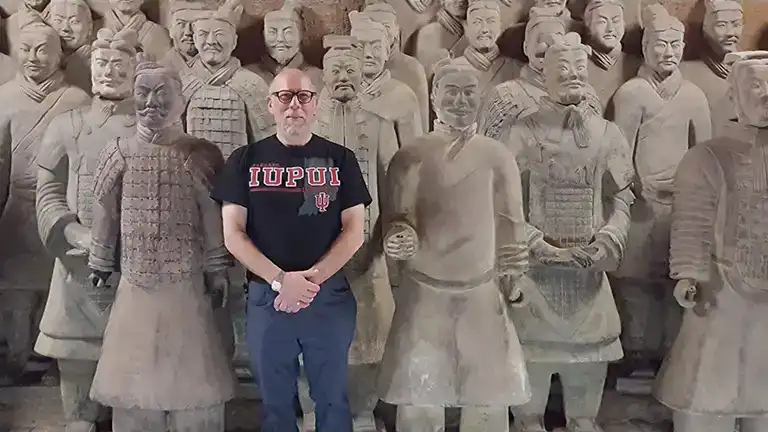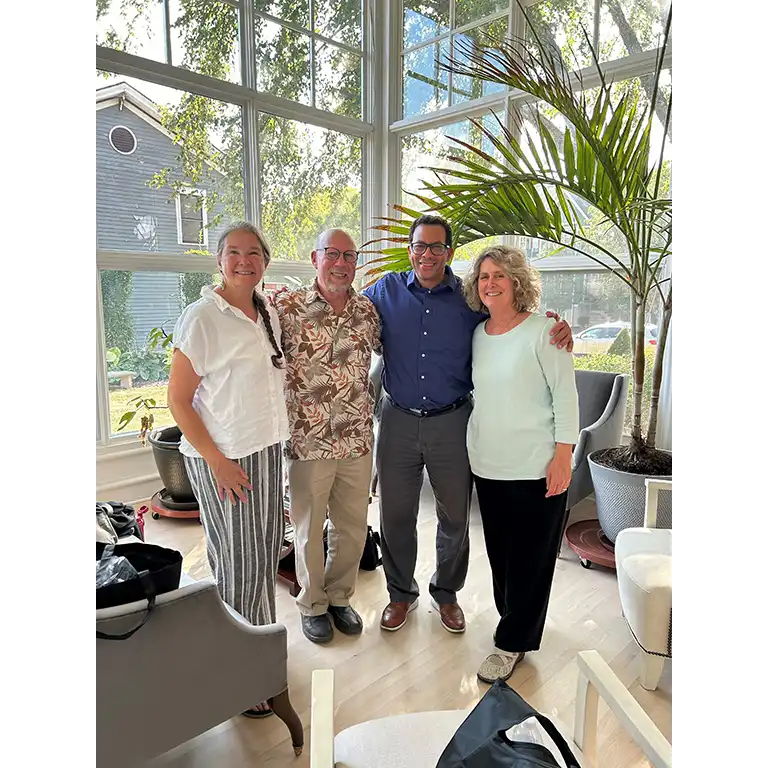By End Lung Cancer Now
November 18, 2024
Lung cancer research saves lives: How clinical trials advance understanding and survivorship
Lung cancer therapies have come a long way since the 1980s, when treatments were limited and screening was decades away. Today, a lung cancer diagnosis comes with hope for recovery—and research through clinical trials is the primary reason why.
Clinical trials transform research in the lab into lifesaving reality at the bedside. In clinical trials, researchers, clinicians, and patients partner to ask and answer important questions that turn exciting breakthroughs into approved treatments for patients.
Through clinical trials, patients get the best standard of care, along with a new therapy that could offer better outcomes. Patient-researcher partnerships are built every day as patients enroll in trials and when family members and others advocate for the benefits that trial participation has to offer.
End Lung Cancer Now exists to empower advocates with information to spread the word about lifesaving clinical trials. We act as a voice for patients, connecting families with answers and providing guidance through the clinical trial process. Along with experts at IU Simon Comprehensive Cancer Center, we help patients remove barriers to joining clinical trials.
Joining a trial allows patients with lung cancer, like Dr. David Heilbronner of Charlottesville, Va., to contribute to life-changing lung cancer research for future patients. Dr. Heilbronner said meeting IU research nurse Margaret “Maggie” Uhrich, RN, changed his life—she helped him enroll in a clinical trial here in Indiana, which ended up saving thousands more lives through a new treatment.
Patients pave the way for innovative therapies
Dr. Heilbronner spent his career as a pediatric orthopedist, talking with patients and families every day. When he was in early 60s, he began to notice unexplained vocal changes.

“All of a sudden my voice would lock up, that’s the best way I can describe it,” he recalled. “I felt like it was a sinus issue, maybe something with postnasal drip.”
Dr. Heilbronner visited his ear, nose, and throat doctor, who couldn’t find an obvious cause for his symptoms. He ordered an X-ray of Dr. Heilbronner’s chest “just to be safe.” Images showed signs of lung cancer.
After diagnosis and staging that revealed inoperable, advanced Stage IIIB cancer, Dr. Heilbronner began treatment: a course of radiation and chemotherapy. And his family members and doctors began searching for a clinical trial—they wanted the best chance at an advanced treatment.
“I still remember, it was nine o’clock at night when my oncologist called,” he recalled. “He said, ‘I think I found something, but we have to jump on it because there is a very narrow window to enroll.’”
The trial criteria required patients to have recently finished traditional treatment before starting the new immunotherapy treatment that was being researched.
“We got on the phone the next day, and that was the first time I talked to Maggie,” Dr. Heilbronner said.
Related reading: How lung cancer screening saved one Hoosier’s life
A career advancing cancer research
Throughout her 40-year career, Uhrich has been at the cutting edge, as monoclonal antibodies, immunotherapy and other important advances were developed. Uhrich has seen treatment and screening technology take leaps and bounds thanks to the collaborative efforts of patients and researchers.
“Translational research is so important,” she said, “because what we learn in the lab can transform what happens at the bedside and how we care for patients. I’ve cared for a lot of patients in clinical trials, and the people who have been willing to participate have paved the way for these therapies to move into a lot of different settings.”
As a nurse researcher, Uhrich serves as a “concierge” for patients all around the world who want to take part in lung cancer clinical trials, including Dr. Heilbronner.
“A study of immunotherapy treatment with the drug pembrolizumab was just being put together, and I was in the right place at the right time,” Dr. Heilbronner recalled. “We made the right phone call to the right person, and I was able to get into the study.”
Helping hand to join clinical trials

“Maggie helped coordinate my wife and I coming for treatment,” said Dr. Heilbronner. “She put us in touch with people and patient support, and she helped us find a place to stay. Every time we were here, she would greet us in the waiting room and make sure things were okay. Providers like Maggie answer patients’ questions about clinical trials and help them know what to expect in a tough and busy time.”
Dr. Heilbronner was the first patient to enroll in this clinical trial for immunotherapy treatment with pembrolizumab conducted in collaboration with the Hoosier Cancer Research Network. After treatment every three weeks for a year through the study, he is a lung cancer survivor. Many other people are too, thanks to those like Dr. Heilbronner who took part in the clinical trial that made this new treatment possible.
With every clinical trial, more patients’ lives are improved and saved. A patient’s willingness to participate and advocate for clinical trials could give someone a future they never thought possible, thanks to discoveries we’ve only just imagined. At End Lung Cancer Now, we work to support patients and help them work through the challenges that may stand in their way.
Helping patients overcome barriers to trial participation
It takes a team to overcome lung cancer, and nurses and support staff play an important role.
“Dealing with a cancer diagnosis is already overwhelming,” Uhrich said. “And then you have to make a lot of difficult and important decisions about a clinical trial. It can be a lot. Don’t be afraid to ask for help.”
One of Uhrich’s primary roles as a nurse researcher is to help patients overcome barriers that can stand in the way of joining a clinical trial. End Lung Cancer Now advocates for lung cancer clinical trials and provides community education about why joining research is so important for patients, today and in the future.
Uhrich and her colleagues provide support services that help patients overcome barriers to trial participation. They help with challenges including:
- Finances
- Insurance
- Geography
- Trial criteria
- Paperwork
When researchers begin a clinical trial, it’s with one purpose: To improve care for patients. Research nurses like Uhrich and others work hard to care for trial participants, to make sure they understand the details of the study. One question patients ask is whether they are allowed to leave a clinical trial after treatment begins, if they wish.
“None of the forms patients sign to join a clinical trial are legally binding contracts to stay in the study,” said Uhrich. “Participants can leave the trial at any time if they choose, and the clinical trial team will help with the process. We will ask questions so we understand what could have been done differently, and to help patients get the care they need.”
Improving lung cancer treatment through research
Our understanding of lung cancer has come a long way, but there is still work to do in educating the public about who can get lung cancer and refining treatments for the disease.
For instance, while the number of new lung cancer cases and deaths are falling, lung cancer remains the second most common cancer in both men and women. The risk of getting lung cancer is higher if a patient smokes or had smoked, yet a woman’s overall chance is about 1 in 17, while a man’s is 1 in 16.
Lung cancer clinical trials have led to approval of innovative and effective therapies. Conducting a clinical trial requires a lot of work and funding, and even though lung cancer is the leading cause of cancer death, other cancer fields such as breast and colon cancer get research funding at higher levels.
That’s why End Lung Cancer Now advocates are so passionate about research and clinical trials — it is our only means to achieving our goal of ending lung cancer. By connecting more people with information about clinical trials, we can help translate important advances in basic science to the clinic and bring impactful therapies to patients around the world.
“Without funds, studies can’t get going, so money is crucial,” Dr. Heilbronner said. “Having people be able to speak to these issues helps other people understand.”
Together, we can save lives
None of us can turn the tide against lung cancer alone. It takes collective action to make important changes that can save lives. Clinical trials help make leading treatments available to everyone, and they’re not possible without people like Dr. Heilbronner who choose to participate.
Clinical trials are complicated, and participating isn’t always easy. At End Lung Cancer Now, we empower participants with the information they need to ask thoughtful questions. And we provide advocates with tools to spread the word about our important efforts. Community involvement informs research planning with diverse perspectives of patients and families living with lung cancer.
A lung cancer diagnosis now comes with more hope, and that’s due to the collective effort of researchers, clinicians and patients who join clinical trials. Together, we are advancing our understanding of lung cancer to make treatment more impactful for everyone.




